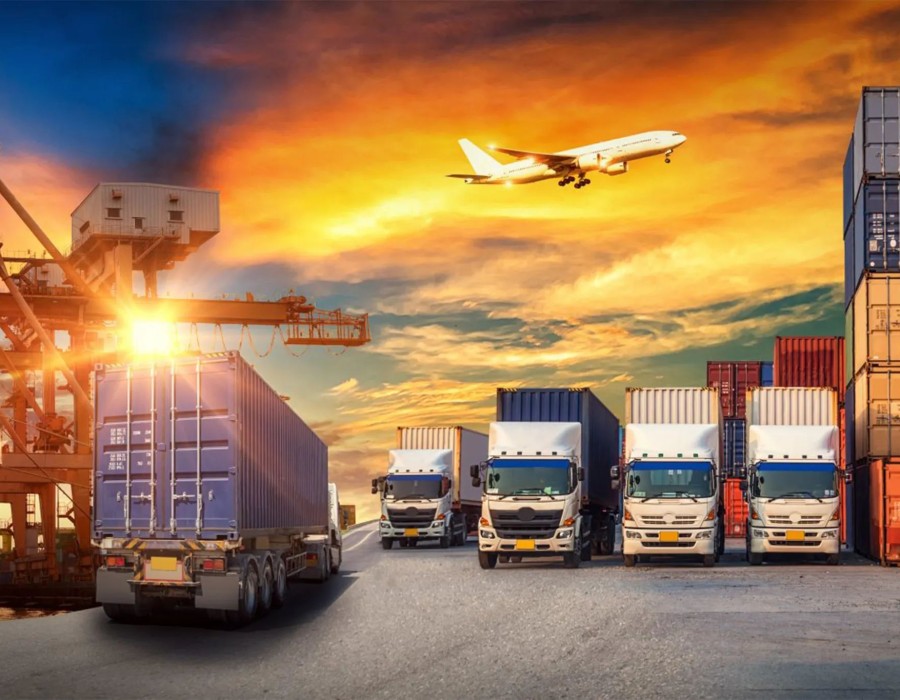In today’s interconnected world, the role of logistics and distribution services has become vital to the success of global businesses. From efficient warehousing to last-mile delivery, a strong logistics and distribution system ensures products reach their destinations on time and in optimal condition, meeting growing consumer demand for speed, accuracy, and convenience.
This article dives into the essential components, benefits, and advancements in logistics and distribution services.
Key Components of Logistics & Distribution Services
- Transportation Management
- Transportation management is central to logistics, involving the planning and execution of product movement by air, land, or sea. It includes route optimization, carrier selection, and load planning, all aimed at ensuring timely and cost-effective delivery.
- Warehousing and Inventory Management
- Warehousing goes beyond storage. Effective logistics services involve systematic inventory tracking, demand forecasting, and replenishment to maintain stock levels. Modern warehousing solutions integrate technology to reduce manual processes, enhancing accuracy and efficiency.
- Order Fulfillment and Packaging
- Order fulfillment includes picking, packing, and shipping goods to end-users. Efficient logistics and distribution services prioritize accuracy, with streamlined processes to ensure the correct products are packaged and shipped. Proper packaging ensures the safe transport of products, minimizing the risk of damage.
- Last-Mile Delivery
- The final stage in the logistics chain, last-mile delivery, is often the most challenging. It covers the journey from the distribution center to the customer’s location. Speed and convenience are essential for satisfying customer expectations, making this a highly competitive area where logistics companies strive to improve efficiency.
- Reverse Logistics
- As e-commerce grows, so does the need for reverse logistics—managing product returns and exchanges efficiently. It includes return transportation, restocking, and disposal, ensuring products are handled in a cost-effective manner that maintains customer satisfaction.
Benefits of Effective Logistics & Distribution Services
- Improved Operational Efficiency
- A well-organized logistics and distribution system ensures that goods move smoothly through the supply chain. Companies benefit from reduced lead times, optimized costs, and better resource allocation, ultimately improving operational efficiency.
- Enhanced Customer Satisfaction
- Timely and accurate delivery is a major factor in customer satisfaction. Reliable logistics services ensure customers receive their orders on time, improving customer loyalty and enhancing the brand’s reputation.
- Reduced Costs and Maximized Profit
- Efficient logistics systems help companies lower transportation and warehousing costs, reduce waste, and improve inventory control. This cost reduction contributes to better profit margins, making logistics an essential factor in profitability.
- Global Market Access
- Logistics and distribution services open doors to global markets. By managing international shipping, customs, and compliance, logistics providers help companies reach customers worldwide, boosting market presence and business growth.
- Supply Chain Transparency
- Today’s logistics providers offer real-time tracking, enabling companies and customers to monitor shipments throughout the delivery process. This transparency enhances trust and helps companies quickly respond to potential disruptions in the supply chain.
Advancements in Logistics & Distribution Services
- Automation and Robotics
- Automation is transforming warehouses, with robotic systems handling tasks like picking, packing, and inventory management. Automated systems boost speed, accuracy, and safety in logistics, reducing human error and labor costs.
- Artificial Intelligence (AI) and Machine Learning (ML)
- AI-driven analytics optimize routes, predict demand, and manage inventory levels. Machine learning algorithms analyze historical data to forecast trends, helping companies maintain stock levels and respond quickly to changing market demands.
- Internet of Things (IoT)
- IoT technology allows for the real-time tracking of vehicles, containers, and even individual packages. With IoT, companies gain valuable insights into the condition of goods during transit, identifying issues such as temperature fluctuations that might affect product quality.
- Blockchain Technology
- Blockchain offers secure and transparent record-keeping for transactions across the logistics supply chain. By providing a tamper-proof record of goods’ movement, blockchain enhances trust and reduces fraud, especially in high-value or regulated goods.
- Sustainable Logistics Solutions
- With growing environmental concerns, many logistics providers are adopting green practices, like eco-friendly packaging, electric delivery vehicles, and carbon footprint tracking. These initiatives not only benefit the environment but also appeal to eco-conscious consumers.
Choosing the Right Logistics & Distribution Partner
Selecting a logistics provider is crucial for a business’s success. Companies should consider the following when choosing a partner:
- Experience and Expertise: Look for providers with proven experience in your industry. Specialized knowledge ensures your products are handled correctly.
- Technology Capabilities: A logistics provider with advanced technology will offer better efficiency, transparency, and accuracy.
- Scalability: As your business grows, your logistics provider should be able to scale services to meet increased demand.
- Cost and Reliability: Compare costs and service reliability. While cost is important, reliability in meeting delivery times and handling goods professionally is essential.
Conclusion
Logistics and distribution services are critical for any company aiming to stay competitive in today’s fast-paced market. From managing complex supply chains to integrating the latest technology, these services play a significant role in delivering value to both businesses and consumers. By investing in efficient logistics, businesses can enhance customer satisfaction, streamline operations, and achieve long-term growth. As technology and consumer expectations evolve, logistics providers are continuously innovating to provide faster, safer, and more sustainable services, ensuring they remain the backbone of global commerce.





Comments